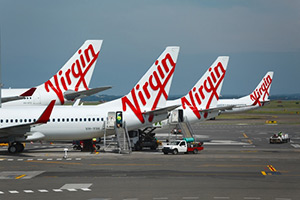Virgin America Inc. (Nasdaq: VA) stock soared as high as $31.19 today (Friday). That's a 35.6% increase from its offer price of $23 per share.
Through its IPO, Virgin America sold 13.3 million shares and raised nearly $306 million. Company officials had previously set a range of $21 to $24 for VA shares.
 At $30 per share, the company is valued at roughly $1.3 billion.
At $30 per share, the company is valued at roughly $1.3 billion.
Virgin America was founded in 2004 by billionaire Sir Richard Branson. Since then, it has branded itself as a hip alternative to major America airlines.
Planes feature purple mood lighting, a television in every headrest, and "sleek" black leather seats. Each plane also has a distinct name like "California Dreaming," "Superfly," and "#nerdbird," just to name a few.
The company may benefit from Branson's branding, but his company Virgin Group actually owns just 22% of the airlines' voting stock. U.S. regulations restrict foreign ownership of U.S. airlines to a maximum 25% stake. Branson's minority holding in the company allows the airline to fly between U.S. cities.
While the company has tried to separate itself from other major airlines, much of the stock's early success is attributed to the airline industry's performance. Across the board, U.S. airline stocks have outperformed the markets in 2014.
Southwest Airlines Co. (NYSE: LUV) has been the biggest winner, up 107% in 2014. American Airlines Group Inc. (Nasdaq: AAL) has climbed 74%, Delta Air Lines Inc. (NYSE: DAL) is up 59%, and JetBlue Airways Corp. (Nasdaq: JBLU) is up 47%.
By comparison, the Dow Jones Industrial Average, Nasdaq, and S&P are all up just 6.4%, 12.1%, and 10.2% in 2014.
Before jumping in on VA stock following today's impressive debut, here are some important figures for investors to watch...
Virgin America (NYSE: VA) Stock: What to Watch After the IPO
One major factor that's been lifting all airline stocks over the past four months is low crude oil prices. The price of oil has dipped precipitously since June. This week, WTI oil fell to $73.25, its lowest level in more than five years.
That's helped airlines keep costs down. Jet fuel has fallen to roughly $2.50 per gallon. It was over $3 per gallon earlier this year. It's also part of the reason for the recent success of airline stocks.
While a comparison seems easy, investors should hesitate to lump Virgin America in with major airlines like American and Delta.
Virgin is much smaller than its competitors with a fleet of just 53 aircraft. It offers lower priced fares to just 21 airports in the U.S. and Mexico.
Virgin first began offering flights in 2007, but it wouldn't turn a profit until 2013. Last year, it made a $10 million profit. From 2009 through 2012, the company lost roughly $395 million.
Income seems to be growing, though. Through the first nine months of 2014, Virgin America earned a net income of $56 million.
But that's not the whole story. Barron's Andrew Bary explains Virgin's numerous upcoming obstacles.
"Challenges for Virgin include gaining sufficient critical mass to attract more business fliers," Bary wrote. "Growth also will be limited since the company is adding just five planes in 2015 and another five in 2016 with no other firm deliveries until around 2020. Virgin's annual revenues of $1.5 billion are less than a third that of JetBlue."
Right now, VA stock is riding an early IPO "pop" based on Richard Branson's name recognition and the success of the airline industry in 2014.
The company needs to show that it can remain profitable and sustain growth for several quarters before VA stock becomes a reliable investment. Buying in now is risky, as investor excitement following the IPO should wane.
Profit from IPOs Now: Investing in IPOs can be risky for retail investors. Unless you have millions of dollars to invest, you'll probably be left out of the big money. But Money Morning experts have found a way for investors to play the IPO market and see the types of gains normally reserved for the "Insiders Club"...
Related Articles
- Barron's: Virgin America IPO May Fly High


